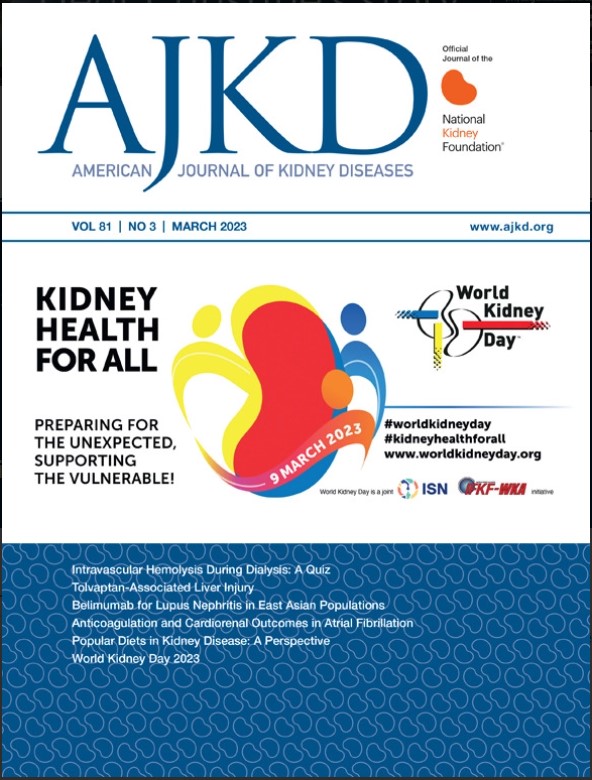住院期间严重血压升高静脉注射降压药后急性肾损伤发生率的治疗效果异质性
IF 9.4
1区 医学
Q1 UROLOGY & NEPHROLOGY
引用次数: 0
摘要
理由和目标:入院后出现的严重高血压(sHTN)在因高血压以外原因入院的患者中占 10%。sHTN 通常采用静脉注射(IV)降压药治疗,但与急性肾损伤(AKI)的更大风险相关。我们的目标是探讨静脉降压药对住院期间罹患 sHTN 的患者 AKI 发生率的影响是否存在异质性:研究设计:治疗效果异质性分析:暴露:在血压升高后3小时内使用静脉降压药治疗.结果:发生AKI的时间:分析方法:分析方法:采用加速衰竭时间贝叶斯加性回归树(BART)模型来捕捉发生 AKI 的时间与预测因素之间的关联。使用反事实结果框架估算每位参与者的个体治疗效果,并利用这些估算结果确定与静脉注射降压药治疗效果异质性相关的患者特征:我们纳入了 11951 例发生 sHTN 的患者,其中 741 例接受了静脉注射降压药治疗,11210 例未接受治疗,分别有 18% 和 13% 的患者发生了 AKI。除了317名白种人、入院时SBP≥156 mmHg、eGFR≥70.7 ml/min/1.73m2和血清碳酸氢盐限制的一小部分患者外,大多数患者都会因静脉注射降压药治疗而受到伤害:数据驱动、假设生成法。结论:这些探索性研究结果表明,大多数罹患 sHTN 的患者不会从静脉注射降压治疗中获益。未来的研究在确定 sHTN 的治疗方案(如果需要的话)时应评估异质性。本文章由计算机程序翻译,如有差异,请以英文原文为准。
Treatment Effect Heterogeneity in Acute Kidney Injury Incidence Following Intravenous Antihypertensive Administration for Severe Blood Pressure Elevation During Hospitalization
Rationale & Objective
Severe hypertension (HTN) that develops after hospital admission is prevalent in 10% of patients admitted for reasons other than HTN. Severe HTN is commonly treated with intravenous (IV) antihypertensives and is associated with a greater risk of acute kidney injury (AKI). We explored whether there is heterogeneity in IV antihypertensives’ effect on AKI incidence among patients who develop severe HTN during hospitalization.
Study Design
Heterogeneity of treatment effect analysis.
Settings & Participants
Patients who developed severe HTN, defined as systolic blood pressure (BP) > 180 or diastolic BP > 110 mm Hg, during hospitalization and did not have kidney failure.
Exposure
Treatment with IV antihypertensives within 3 hours of BP elevation.
Outcome
Time to developing AKI.
Analytical Approach
An accelerated failure time Bayesian additive regression trees (BART) model to capture the association between the time to develop AKI and predictors. Individual treatment effects were estimated for each participant using a counterfactual outcome framework, and these estimates were used to identify patient characteristics associated with treatment effect heterogeneity in response to IV antihypertensives.
Results
We included 11,951 patients who developed severe HTN, 741 were treated with IV antihypertensives, and 11,210 were not, of whom 18% and 13% developed AKI, respectively. Most patients would have been harmed from IV antihypertensive treatment except for a small subset of 317 patients who were White, had a systolic BP on admission ≥156 mm Hg, an estimated glomerular filtration rate of ≥70.7 mL/min/1.73 m2, and a serum bicarbonate of <21.7 mmol/L.
Limitations
Data-driven, hypothesis-generating approach. Findings were not validated with external data sources.
Conclusions
These exploratory findings suggest that most patients who develop severe HTN will not benefit from IV antihypertensive treatment. Future studies should assess for heterogeneity when identifying treatment options, if any are needed, for severe HTN.
Plain-Language Summary
Patients who develop severe blood pressure elevation during hospitalization are commonly treated with intravenous antihypertensives; however, this could lead to acute kidney injury (AKI). We wanted to assess whether this is consistent across all patients, using a new statistical approach that predicts what would happen if patients who were treated had not been treated and those who were not treated had been. We found that most patients will develop AKI, and only a small subset of patients might not. This exploratory study can help inform future studies on the treatment of hypertension that develops during hospitalization.
求助全文
通过发布文献求助,成功后即可免费获取论文全文。
去求助
来源期刊

American Journal of Kidney Diseases
医学-泌尿学与肾脏学
CiteScore
20.40
自引率
2.30%
发文量
732
审稿时长
3-8 weeks
期刊介绍:
The American Journal of Kidney Diseases (AJKD), the National Kidney Foundation's official journal, is globally recognized for its leadership in clinical nephrology content. Monthly, AJKD publishes original investigations on kidney diseases, hypertension, dialysis therapies, and kidney transplantation. Rigorous peer-review, statistical scrutiny, and a structured format characterize the publication process. Each issue includes case reports unveiling new diseases and potential therapeutic strategies.
 求助内容:
求助内容: 应助结果提醒方式:
应助结果提醒方式:


